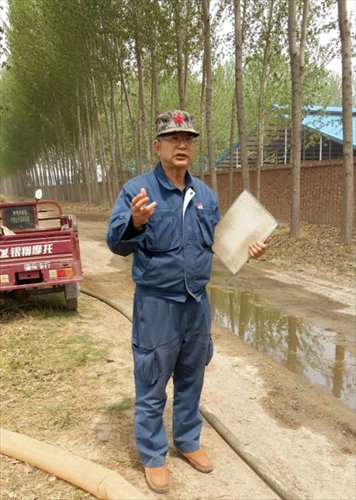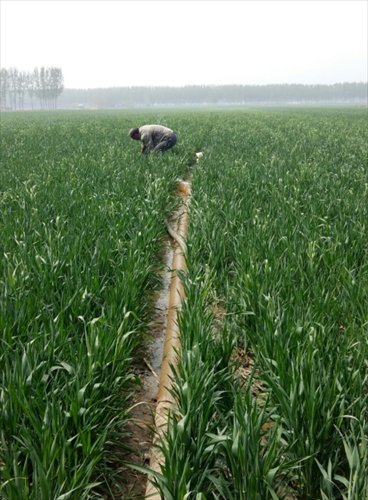
Kawasaki Hiroto working on his farm in Xiaoliugu village, Henan Province.
With the environment and its impact on people's health increasingly becoming a source of concern in China, Kawasaki Hiroto, a retired agricultural expert from Japan, sensed the country's need for organic farming.
When he first came to China in 2006 after retiring and looking for job opportunities, he stayed in villages around Qingdao, Shandong Province. There, he was surprised to see local farmers applying large amounts of chemical fertilizers and pesticides to their fields.
It was then that he decided to promote compost in China, something he had been doing for decades back in Japan.
The excessive use of chemical fertilizers in farming has become a major contributing cause in China's groundwater pollution problem, according to the Ministry of Water Resources. And that coincides with what Kawasaki sees as the potential for developing non-chemical, organic farming.
When he returned to China in 2013, he was prepared to settle down and work, seeing the great potential in what he can do.
Touring the country
For almost a year, Kawasaki traveled around China's rural areas in 2013, from the coastal, relatively developed regions of Shanghai, Zhejiang and Guangdong, to the more traditionally rural provinces like Gansu, Shaanxi and Shanxi.
Unfortunately, his ideas about reducing the use of chemical fertilizer met with resistance from local farmers, who either refused to give up on quick and effective growth boosters or fail to adequately carry out his techniques.
It was not until January 2014 that he finally decided to settle down in Xiaoliugu village in Yuanyang county of Central China's Henan Province, where local farmers were eager to improve their farming and increase their incomes.
Kawasaki proposed using liquid fertilizer produced from compost to irrigate wheat paddies and build compost plants. The farmers were cooperative, which made him believe he could put his idea of growing produce through compost, and eventually building up a circular agriculture project, into practice.
They collected cattle dung from dairy farms and piled it into compost sites for the bacteria to turn it into fertilizer.
More than two years after kicking off his farming project in the village, the hard work has begun to pay off. He has built a compost site as well as a site for producing liquid fertilizer.
Farm products grown with organic methods have become increasingly popular among urban consumers, and their prices could be many times higher than those of non-organic products. This is a result of the excessive use of chemical fertilizers, which Kawasaki said has reduced the quality of soil as well as the quality of food.
There was a time decades ago when there was very little chemical fertilizer available to Chinese farmers, but now chemical fertilizers used in China account for one third of the world's total. Since the country decided to head for a more "modern" era of agricultural development in the early 1980s, grain production per unit area increased by more than 50 percent, while fertilizer usage more than doubled, media reported.

Kawasaki Hiroto working on his farm in Xiaoliugu village, Henan Province.
Demand for quality
Kaawsaki believes that as urban Chinese pay more attention to what they eat, they are becoming more willing to spend on better quality food.
Wheat grown with organic methods has already sold well, and this year, rice paddies will also be included in the fertilizing scheme. Other organic products include sweet potatoes and tomatoes.
The Xiaoliugu farm has started negotiations with a high-end Beijing restaurant to provide them with produce.
Li Wei, a member of the Xiaoliugu farm, said more and more local farmers are joining in this program, and they have realized the advantage of this kind of organic farming. The next step, she said, will involve farmers learning to grow vegetables using these methods, even though it will take time to master the skills and further popularize it.
Heads from Xiaoliugu and adjacent villages like Liuyuan have become supportive of what Kawasaki is doing, and helped promote his techniques among villagers.
As a Christian, Kawasaki is dedicated to promoting his ideas of farming, which he said is his life's mission. Earlier this month, he began recruiting apprentices to train them in organic farming concepts and skills.
His wife and children have been supportive, but he has seldom gone back to Japan in the last few years.
After coming to China, the 70-year-old began learning Chinese. He is now able to communicate with locals, and has opened his own Weibo account, frequently updating followers on his life in China.
Trying new things
Greatly encouraged by his initial success, Kawasaki is also experimenting on modifiers to recondition the already compacted soil. He said the goal is to eventually realize the "Sixth Industry" in China, a concept initiated by Japanese agricultural experts in the 1990s, which combines farm producing, processing and marketing.
The farms will be turned into scenic spots for visitors to experience rural life, while at the same time improving farmers' livelihoods. That's the ultimate goal for him, he said.
After living in China's villages for years, Kawasaki became familiar with Chinese rural society and more accustomed to things that once baffled him. But in September last year, one of the female workers in his farm was caught up in a serious case of domestic violence. Her husband even chased her onto the farm at night, and vandalized the farm facilities.
Kawasaki asked the woman to divorce her husband. However, as the man refused to divorce, the police could do nothing to protect her. The lawyer said that according to Chinese law, it would take six months for the woman to get a divorce.
Kawasaki wrote comments about his bafflement on his Weibo, which was then reposted and commented on thousands of times.
"Are Chinese women protected by the law?" he asked, saying that in Japan, women can go to facilities specially set up for them to avoid domestic violence. "I want to build farms that protect women."

